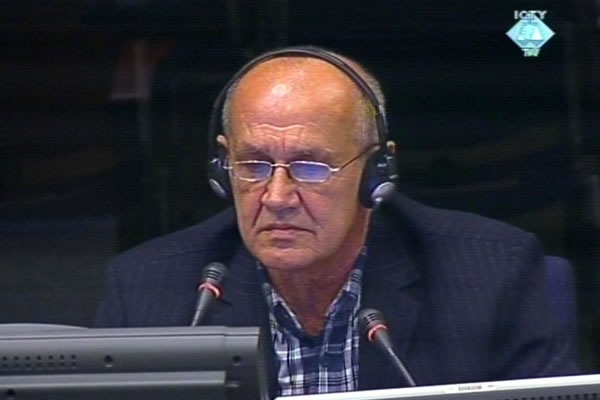Home
‘THE WILD WEST’ IN ZVORNIK
As Radovan Karadzic cross-examined Petko Panic from Zvornik, he tried to prove that the municipality didn’t have enough money to pay for Arkan’s ‘services’. Karadzic contends that in the first months of the war Zvornik was under the control of ‘renegade’ paramilitary forces and nobody dared to confront them
 Petko Panic, witness at the Radovan Karadzic trial
Petko Panic, witness at the Radovan Karadzic trial In the cross-examination of former assistant commander of the Serb police in Zvornik Petko Panic, the accused Radovan Karadzic denied his responsibility for the crimes committed by the Serb forces in Zvornik. Karadzic insisted that the town was controlled by the paramilitary formations under the command of Vojin Vuckovic Zuco, his brother Dusko Vuckovic Repic, Milorad Gogic, Simo the Chetnik, Niski, Pivarski and the others.
Karadzic tried to contest or at least play down the significance of the claims that the municipal authorities paid 300,000 German Marks to Zeljko Raznatovic Arkan’s Tigers to ‘liberate’ Zvornik. Karadzic put it to the witness that ‘the partial owners of the Glinica factory, who were located in Serbia, were concerned about their investment because the factory made a daily profit of 1 million US dollars’. According to Karadzic, the owners decided to pay for the protection of the factory.
Responding to Karadzic’s suggestions, the witness said he knew that Jevto Subotic, who was the director of the Glinica Factory, arrived in Zvornik at the beginning of the conflict but didn’t know why. Karadzic then asked the witness if he thought that the municipality actually had that amount of money at the time. ‘I don’t think so,’ the witness replied, adding that he didn’t know how the money Arkan got was obtained.
In the examination-in chief, the prosecutor brought up some documents that show that the members of various paramilitary formations received their pay from the municipal budget. Karadzic tried to prove that the municipal authorities were powerless to confront the paramilitaries. Karadzic said that Arkan used to slap Serb police officers in Zvornik because they wore the five-point star insignia on their caps, instead of the Serbian eagles. As Karadzic claimed, at one point Zuco forcibly took command over the Zvornik Brigade. According to Karadzic, people were more afraid of Repic, who wore a long coat and carried a Scorpion submachine gun than of possible Muslim attacks.
Karadzic argued that the paramilitary groups established and controlled most of the prisons in Zvornik, and banned the regular police and army from entering those facilities. Karadzic used the example of the Alhos prison to show that ‘there were few eyewitnesses’: this was because the paramilitaries committed their crimes against the prisoners in secret. The police and active service soldiers knew nothing about them. The witness confirmed that the Cultural Center in Drinjaca was under the control of Pivarski and that Zuco’s brother Dusko Vuckovic Repic controlled the Technical School in Karakaj.
According to Karadzic, it was only after Gogic’s group was expelled and Zuco’s group was arrested on 28 July 1992 that ‘law and order’ returned to Zvornik. Karadzic illustrated the efforts of the civilian authorities with an order preventing the import of arms into Zvornik. The accused stressed that ‘as in the Wild West’ the police seized the weapons from those who carried them without a proper license.
Karadzic also tried to prove that Zvornik municipality acted like ‘a state within the state’: it was quite independent from the republican authorities. Zvornik municipality assumed decision-making powers, going as far as to appoint the military prosecutor.
Radovan Karadzic’s trial continued with the evidence of a new witness, in closed session.
